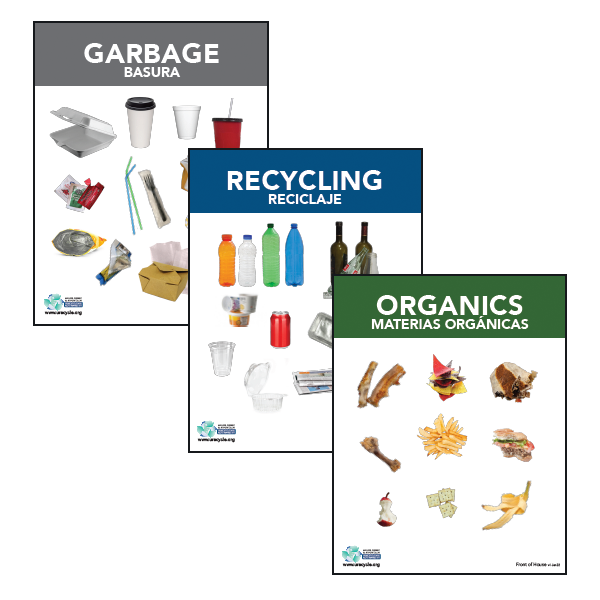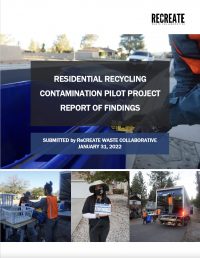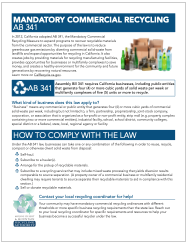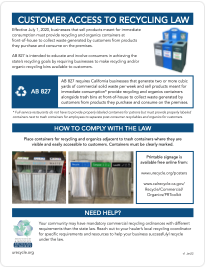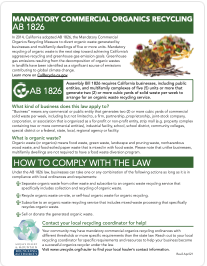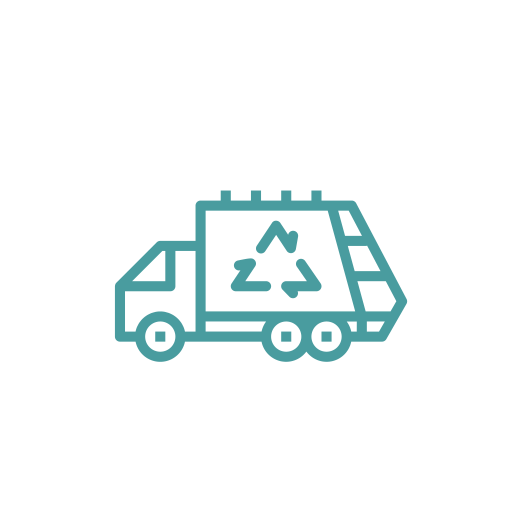RECYCLING RESOURCES
Links to recycling resources for the High Desert area, California, and beyond.
Recycling Resources
Links to recycling resources for the High Desert area, California, and beyond.
Signage for Your Collection Containers
Print these posters and place with your recycling, organics, and garbage collection containers so everyone knows what belongs in what container.
Residential Recycling Contamination Pilot Project Report of Findings
In 2020 the Authority contracted with ReCREATE Waste Collaborative to conduct a pilot study with the goal of identifying and reducing contamination in the residential commingled recycling stream. You can read the project overview, key findings, and recommendations in the ReCreate Project Report.
California Residential Recycling Laws
In an effort to reduce greenhouse gas emissions, keep valuable material out of landfills, and create a healthy environment for our community and future generations by recovering natural resources, California has enacted a mandatory organics recycling law that impacts residents and businesses alike. SB 1383 requires the state to dramatically expand its composting abilities and reduce the amount of waste sent to landfills.
Mandatory Organics Recycling Law SB 1383
The law sets the following targets to be achieved by 2025:
- DIVERT ORGANICS FROM LANDFILL – Reduce statewide disposal of organic waste by 75% from 2014 levels.
- RECOVER EDIBLE FOOD – Rescue at least 20% of currently disposed of edible food (food intended for human consumption) to feed people in need. This portion of the law impacts commercial food generators, not residents.
Why Diverting Organic Waste from Landfill is Important
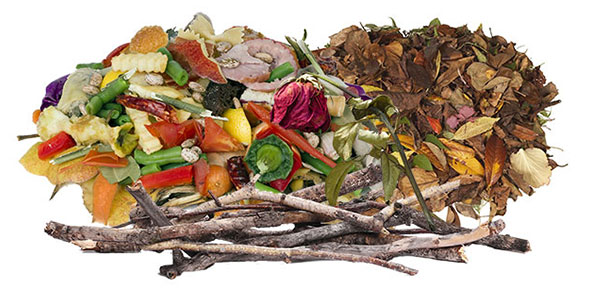 Organic waste (organics) such as food waste, green waste, landscape and pruning waste, and nonhazardous wood waste make up half of what Californians dump in landfills. When organic waste is sent to landfill, it decomposes anaerobically (without oxygen) which creates methane — one of the most potent greenhouse gases in Earth’s atmosphere. Methane is a short-lived climate pollutant that is 84 times stronger than carbon dioxide over a 20-year period. NASA recently captured satellite images of California landfills and published an inventory showing them as super emitters of methane.
Organic waste (organics) such as food waste, green waste, landscape and pruning waste, and nonhazardous wood waste make up half of what Californians dump in landfills. When organic waste is sent to landfill, it decomposes anaerobically (without oxygen) which creates methane — one of the most potent greenhouse gases in Earth’s atmosphere. Methane is a short-lived climate pollutant that is 84 times stronger than carbon dioxide over a 20-year period. NASA recently captured satellite images of California landfills and published an inventory showing them as super emitters of methane.
Keeping organic material out of landfills will slow the rate of greenhouse gas accumulation and begin to reduce their impacts.

Learn more about SB 1383 by visiting the California Department of Resources Recycling and Recovery website.
California Commercial Recycling Laws
The laws covered below apply to a “business” defined as any commercial or public entity including but not limited to, a firm, partnership, proprietorship, joint-stock company, corporation, or association that is organized as a for-profit or non-profit entity, strip mall (e.g. property complex containing two or more commercial entities), industrial facility, school, school district, community colleges, special district or a federal, state, local, regional agency or facility.
If your business qualifies, please read through these carefully and contact your local recycling coordinator to make sure your business is in compliance.
Mandatory Organics Recycling Law SB 1383
SB 1383 is a new law that requires the state to dramatically expand its composting abilities and reduce the amount of waste sent to landfills.
The law sets the following targets to be achieved by 2025:
- DIVERT ORGANICS FROM LANDFILL – Reduce statewide disposal of organic waste by 75% from 2014 levels.
- RECOVER EDIBLE FOOD – Rescue at least 20% of currently disposed of edible food (food intended for human consumption) to feed people in need.
Why Diverting Organic Waste from Landfill is Important
 Organic waste (organics) such as food waste, green waste, landscape and pruning waste, and nonhazardous wood waste make up half of what Californians dump in landfills. When organic waste is sent to landfill, it decomposes anaerobically (without oxygen) which creates methane — one of the most potent greenhouse gases in Earth’s atmosphere. Methane is a short-lived climate pollutant that is 84 times stronger than carbon dioxide over a 20-year period. NASA recently captured satellite images
Organic waste (organics) such as food waste, green waste, landscape and pruning waste, and nonhazardous wood waste make up half of what Californians dump in landfills. When organic waste is sent to landfill, it decomposes anaerobically (without oxygen) which creates methane — one of the most potent greenhouse gases in Earth’s atmosphere. Methane is a short-lived climate pollutant that is 84 times stronger than carbon dioxide over a 20-year period. NASA recently captured satellite images
of California landfills and published an inventory showing them as super emitters of methane.
Keeping organic material out of landfills will slow the rate of greenhouse gas accumulation and begin to reduce their impacts.
Edible Food Recovery
Food recovery means collecting edible food that would otherwise go to landfill and redistributing it to feed people in need. Californians send 11.2 billion pounds of food to landfills each year, some of which was still fresh enough to have been recovered to feed people in need. One in 5 children go hungry every night in California – redirecting perfectly edible food to feed those in need can help alleviate this. Feeding hungry people through food recovery is the best use of surplus food and a vital way for California to conserve resources and reduce waste thrown in landfills.
To reduce food waste and address food insecurity, surplus edible food will instead go to food banks, soup kitchens, and other food recovery organizations and services to help feed Californians in need.
How can your business comply with SB 1383?
Everyone: cities, trash haulers, processors and generators like businesses and single/multifamily residents are required to keep organic materials out of the landfill and can receive fines if they do not comply.
If you own a business or apartment/condo complex (of five units or more), you are required to:
- Divert organics from the landfill by arranging for organics collection service (likely provided by your current garbage and recycling hauler) OR self-haul organic waste to a specified composting facility,
community composting program, or other collection activity or program. - Provide collection containers for recycling and organics to customers, tenants, and employees.
- Provide education to employees and customers on proper sorting of recyclables and organic materials. We offer free printable posters to help with this.
- Some commercial food generators are required to recover edible food. Contact your city’s recycling coordinator to find out more.
Get Signage
We offer free 8.5×11 pdf downloadable signage for front and back of house use. Find them here.
Printable signage is also available free online from CalRecycle’s PR Tool Kit.

Learn more about SB 1383 by visiting the California Department of Resources Recycling and Recovery website.
Mandatory Commercial Recycling Law AB 341
If your business produces four (4) cubic yards or more of solid waste per week, California law requires that you recycle.
In 2012, California adopted AB 341, the Mandatory Commercial Recycling Measure to expand programs to recover recyclable materials from the commercial sector. The purpose of the law is to reduce greenhouse gas emissions by diverting commercial solid waste from landfills and expand opportunities for recycling in California. It also creates jobs by providing materials for recycling manufacturing facilities, provides opportunities for businesses or multifamily complexes to save money, and creates a healthy environment for the community and future generations by recovering natural resources.
Assembly Bill 341 requires California businesses, including public entities, and multifamily complexes of five (5) units or more that generate four (4) or more cubic yards of solid waste per week to recycle.
How can your business comply with AB 341?
Under the AB 341 law, businesses can take one or any combination of the following in order to reuse, recycle, compost or otherwise divert solid waste from disposal:
- Self-haul.
- Subscribe to a hauler(s).
- Arrange for the pickup of recyclable materials.
- Subscribe to a recycling service that may include mixed waste processing that yields diversion results comparable to source separation. (A property owner of a commercial business or multifamily residential dwelling may require tenants to source separate their recyclable materials to aid in compliance with this section.)

Learn more about AB 341 by visiting the California Department of Resources Recycling and Recovery website.
Download the AB 341 Flier
Customer Access to Recycling AB 827
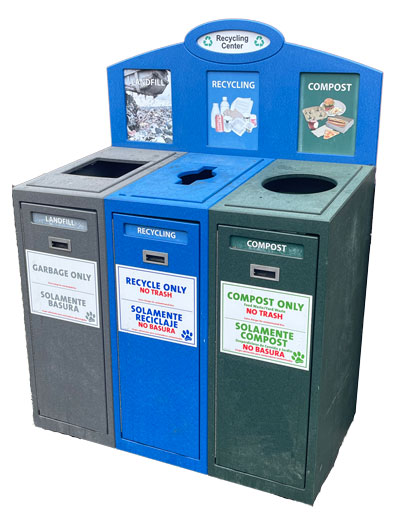
Effective July 1, 2020, businesses that sell products meant for immediate consumption must provide recycling and organics containers at front-of-house to collect waste generated by customers from products they purchase and consume on the premises.
AB 827 is intended to educate and involve consumers in achieving the state’s recycling goals by requiring businesses to make recycling and/or organic recycling bins available to customers.
AB 827 requires California businesses that generate two or more cubic yards of commercial solid waste per week and sell products meant for immediate consumption* provide recycling and organics containers alongside trash bins at front-of-house to collect waste generated by customers from products they purchase and consume on the premises.
* Full-service restaurants do not have to provide properly labeled containers for patrons but must provide properly labeled containers next to trash containers for employees to separate post-consumer recyclables and organics for customers.
How can your business comply with AB 827?
Place containers for recycling and organics adjacent to trash containers where they are visible and easily accessible to customers. Containers must be clearly marked.
GET SIGNAGE
We offer free 8.5×11 pdf downloadable signage for front and back of house use. Find them here.
Printable signage is also available free online from CalRecycle’s PR Tool Kit.
Download the AB 827 Flier
Mandatory Commercial Organics Recycling Law AB 1826
If your business produces two (2) cubic yards or more of solid waste per week, California law requires that you recycle your organic waste.
In 2014, California adopted AB 1826, the Mandatory Commercial Organics Recycling Measure to divert organic waste generated by businesses and multifamily dwellings of five or more units. Mandatory recycling of organic waste is the next step toward achieving California’s aggressive recycling and greenhouse gas emission goals. Greenhouse gas emissions resulting from the decomposition of organic wastes in landfills have been identified as a significant source of emissions contributing to global climate change.
Assembly Bill 1826 requires California businesses, including public entities, and multifamily complexes of five (5) units or more that generate two (2) or more cubic yards of solid waste per week to arrange for an organic waste recycling service.
What is Organic Waste?
 Organic waste (or organics) means food waste, green waste, landscape and pruning waste, nonhazardous wood waste, and food-soiled paper waste that is mixed in with food waste. Please note that unlike businesses, multifamily dwellings are not required to have a food waste diversion program.
Organic waste (or organics) means food waste, green waste, landscape and pruning waste, nonhazardous wood waste, and food-soiled paper waste that is mixed in with food waste. Please note that unlike businesses, multifamily dwellings are not required to have a food waste diversion program.
How can your business comply with AB 1826?
Under the AB 1826 law, businesses can take one or any combination of the following actions as long as it is in compliance with local ordinances and requirements:
- Separate organic waste from other waste and subscribe to an organic waste recycling service that specifically includes collection and recycling of organic waste.
- Recycle organic waste on-site, or self-haul organic waste for organic recycling.
- Subscribe to an organic waste recycling service that includes mixed-waste processing that specifically recycles organic waste.
- Sell or donate the generated organic waste.

Learn more about AB 1826 by visiting the California Department of Resources Recycling and Recovery website.
Download the AB 1826 Flier
Contact Your Hauler
Your community may have mandatory commercial recycling ordinances with different thresholds or more specific business recycling requirements than the state law. Reach out to your hauler for specific requirements and resources to help your business become successful recyclers under the law.
California Associations & Organizations
California
- California Department of Resources Recycling and Recovery (CalRecycle)
- California Resource Recovery Association (CRRA)
- California Product Stewardship Council
- Californians Against Waste
- Association of Compost Producers
- Northern California Recycling Association (NCRA)
- Alameda County Waste Management and Recycling Board
- San Mateo County RecycleWorks
National Associations & Organizations
- U.S. Environmental Protection Agency
- National Recycling Coalition
- United States Composting Council
- How to Compost
- Container Recycling Institute
- Zero Waste USA
- Solid Waste Association of North America
- Bottle Bill Resource Guide
- Recycling Partnership
Industry Groups
- Institute of Scrap Recycling Industries
- American Forest and Paper Association
- American Plastics Council
- Association of Postconsumer Plastics Recyclers
- Steel Recycling Institute
- Sustainable Packaging Coalition
- Construction and Demolition Recycling Association
- Bureau of International Recycling
- Glass Packaging Institute
- Recycling Market Development Platform
Journals
Composting
- Several High Desert & Mountain communities have implemented curbside organics collection.
- San Bernardino County Department of Public Works Backyard Composting Information
- High Desert guide to designing, planting and maintaining attractive and water-efficient landscapes from the Mojave Water Agency.
- Read the Farmer’s Almanac article on Hot and Cold Methods of Composting.
- Watch this video from Huw Richards with Grow Food Organically about you how to get started with your first ever compost bin.
- Watch this video from the New Mexico Recycling Coalition on how to make a backyard compost system in a High Desert environment.
Find Your Hauler
The best place to start for information about your local curbside recycling service is to contact your hauler.
Copyright © 2024 Mojave Desert & Mountain Recycling Authority. All Rights Reserved.

